
CATEGORIES:
BiologyChemistryConstructionCultureEcologyEconomyElectronicsFinanceGeographyHistoryInformaticsLawMathematicsMechanicsMedicineOtherPedagogyPhilosophyPhysicsPolicyPsychologySociologySportTourism
Answer the questions below.
1. What reasons are given for bribery and corruption occurring?
2. Which anti-corruption organisation is mentioned?
3. Two types of bribery are mentioned. What are they?
4. What is the answer to the Quick Quiz?
What exactly is corruption?
Various authorities offer definitions of corruption. Transparency International (an organization committed to fighting corruption all over the world) defines it as ‘the misuse of entrusted power for private gain’. The Oxford English Dictionary defines it as a willingness ‘to act dishonestly in return for money or personal gain’. However, the fact that there are different types of corruption makes it difficult to arrive at a single all-encompassing definition. There is a difference between bribing an official to do something legal (e.g. bribing a civil servant to speed up the process of acquiring a document of some sort) and bribing an official to do something illegal (e.g. bribing a teacher to give you a good mark in an exam when in fact you didn’t pass).
Why does it happen?
There are various reasons why corruption takes place and takes hold. Sometimes it is due to the fact that officials are simply not paid very much and so they need to supplement their salaries with money from bribes. Sometimes the bureaucratic system is set up in such a way that officials simply refuse to carry out their duties unless they are ‘encouraged’ by being offered bribes. In other cases it is actually part of the tradition and culture of a country to give and receive ‘gifts’ in order to get anything done. In some cases companies from less corrupt countries allegedly engage in bribery in order to do business in countries where corruption is the norm, otherwise they would not be able to operate successfully in those countries. It can be argued that if such companies did not bribe officials in the necessary countries then the economies of those countries would suffer because fewer companies would invest in them, thus making them poorer. On a smaller scale corruption is often just a result of people’s natural desire to ‘beat the system’. Mostly, corruption occurs in environments where it is tolerated and where the temptation is too strong to resist.
How does it affect us?
First and foremost paying bribes costs money, obviously, so it leaves you out of pocket. It can also cost people their health, if they cannot afford to bribe the necessary officials to receive medical treatment, or even, in extreme cases, their freedom or their lives. The economy and infrastructure of the whole country can suffer if officials and politicians are siphoning off funds intended for road-building, new schools and hospitals etc. in an effort to line their own pockets.
How can we fight it?
Obviously, the ordinary person in the street who tolerates a corrupt system would need to make a stand, refuse to pay bribes and blow the whistle on corrupt officials. Easier said than done in many cases! However, there are international organizations who are fighting to reduce corruption on a global level, with some measurable success – Transparency International, for example.
Ultimately, a significant reduction in corruption could be achieved if all sections of society (political, commercial and civil) worked together with common aims to achieve it.
Quick Quiz: Read the clues below and write the solutions on a piece of paper. Then take the first letter of each answer and rearrange them to find the hidden word connected with this Talking Point.
1. Corruption is often just a result of people’s __________ desire to ‘beat the system’.
2. Various authorities offer __________ of corruption.
3. It can also cost people their health, __________ they cannot afford to bribe the necessary officials to receive medical treatment.
4. There are various reasons why corruption takes place and takes __________.
5. __________ said than done in many cases!
6. The fact that there are different types of corruption makes it difficult to arrive at a __________ all-encompassing definition.
7. Corruption __________ in environments where it is tolerated and where the temptation is too strong to resist.
8. Ultimately, a __________ reduction in corruption could be achieved if all sections of society (political, commercial and civil) worked together with common aims to achieve it.
9. In other cases it is actually part of the __________ and culture of a country to give and receive ‘gifts’.
Corruption Widespread in 70 Countries
1. Lead-in: Corrupt People
What people do you normally associate with corruption?
In pairs / groups, talk about how corrupt you think the following people might be.
What kinds of corrupt practices could they engage in?
What damage could they do? Who suffers from their corruption?
|
|
2. Before listening:
1) Match the following synonyms from the article:
| a. | watchdog | 1) openness |
| b. | transparency | 2) hollow words |
| c. | ascertain | 3) understanding |
| d. | perceptions | 4) defeating |
| e. | deteriorating | 5) defender |
| f. | overcoming | 6) actively |
| g. | scourges | 7) determine |
| h. | vigorously | 8) deliberate |
| i. | calculated | 9) worsening |
| j. | lip service | 10) curses |
2) Look at the article’s headline and guess whether these sentences are true (T) or false (F):
| a. | A global anti-corruption watchdog issued a report on corruption. | T / F |
| b. | Corruption is widespread in poor countries only. | T / F |
| c. | Iceland has the world’s cleanest publicly run affairs. | T / F |
| d. | Nigeria experienced the biggest deterioration in transparency. | T / F |
| e. | The report states corruption is a minor cause of poverty. | T / F |
| f. | A top official said corruption was a natural disaster. | T / F |
| g. | The official said leaders must go beyond eye service to keep promises. | T / F |
| h. | The world has set its sights on halving extreme poverty by 2015. | T / F |
Comprehension Check
Listen and check your answers.
Extension Activities
1) Look at the types and examples of corruption below. In pairs / groups, match the type of corruption to the example.
embezzlement fraud bribery nepotism extortion
illegal monetary contributions to political parties conflict of interest
a) Person A gives a customs officer $100. The customs officer allows person A to take illegal drugs into the country___________________________
b) A construction company boss wants to win a construction contract. He uses threats and violence against a local politician to be given the contract.___________________________
c) A head of department in a company wants to help his friend get a good job. He chooses his unqualified and inexperienced friend for an available job instead of highly experienced and qualified candidates._______________________________
d) The United Nations provides emergency aid money to country X. The leader of country X
redirects a lot of the money to his personal bank account._______________________
e) A top politician who is also on the board of directors of an oil company uses his influence to win the oil company a major contract.________________________________
f) A drug company executive lies to a newspaper reporter about an impending outbreak of a virus. That information increases the price and sales of the drug.______________________
g) A tobacco company executive gives an illegal $100,000 to a political party that has suggested it might cut taxes on cigarettes.________________________________
2) Decide how serious each type of corruption is and what the penalty should be.
3)In pairs / groups, decide whether the following are examples of petty or grand corruption. How would you punish the offenders?
- Giving a policemen money to escape a motoring fine.
- A construction company boss rewarding a politician to win a big contract.
- A cousin is hired for a job for which he is less qualified than other candidates.
- A country’s leader misdirects aid into his own bank account.
- A company employee finds a way to secretly receive two salaries a month.
- A tobacco company illegally contributes money to a political party.
- A customs official allows a flu-infected chicken into the country for $100.
- A company CEO fakes accounts, which causes the company’s collapse.
| TYPE | EXAMPLE | PENALTY |
| Bribery | Person A gives a customs officer $100. The customs officer allows person A to take illegal drugs into the country | |
| Extortion | A construction company boss wants to win a construction contract. He uses threats and violence against a local politician to be given the contract. | |
| Nepotism | A head of department in a company wants to help his friend get a good job. He chooses his unqualified and inexperienced friend for an available job instead of highly experienced and qualified candidates. | |
| Embezzlement | The United Nations provides emergency aid money to country X. The leader of country X redirects a lot of the money to his personal bank account. | |
| Conflict of interest | A top politician who is also on the board of directors of an oil company uses his influence to win the oil company a major contract. | |
| Fraud | A drug company executive lies to a newspaper reporter about an impending outbreak of a virus. That information increases the price and sales of the drug. | |
| Illegal monetary contributions to political parties | A tobacco company executive gives an illegal $100,000 to a political party that has suggested it might cut taxes on cigarettes. |



Why do we give bribes?
How long before most Ukrainians stop condoning corruption?
What must be done to combat this scourge?
According to the Kyiv International Institute of Sociology (KMIS), 50 percent of Ukrainians believe that law enforcement agencies, educational establishments, medical institutions, and the judicial authorities are the most corrupt institutions in the country.
Not a single important problem, including enrollment in institutions of higher learning, can be solved without the offer and acceptance of bribes.
The findings of the poll “Corruption in Higher Education,” which was conducted by the Gorshenin Institute this past September, indicate that 63 percent of Ukrainians citizens have given presents or money to lecturers at institutions of higher education during enrolment or the course of studies.
When and how will this situation improve? KMIS’s findings indicate that 65 percent of Ukrainians believe there will be less corruption in Ukraine once citizens learn about their rights and ways to protect them. Experts, however, believe that this problem will disappear only after citizens stop using corruption as a method of self-assertion; when the people in power and the general public start living according to the new rules.
Is it possible to live without offering and accepting bribes? Is Ukraine prepared to live this way? The Day asked its experts to answer these questions.
Dr. Mykola VASKIV, professor at Ivan Ohiienko National University, Kamianets-Podilsky:
If bribery and corruption exist, this means that there are people who need these phenomena, and there are certain prerequisites for them. There are interesting statistics on corruption in various countries. Out of 180 countries, Ukraine traditionally scores 100 something. There is, however, another remarkable index: the three countries with the lowest levels of corruption received 9.3 points on a 10-point scale – in other words, there is a 0.7 level of corruption even in such countries. No country can boast of having completely overcome corruption. This means that the desire to obtain additional funds for a certain illegal bureaucratic transaction is germane to human nature. However, while in some countries such preconditions and manifestations of this reprehensible phenomenon are severely restricted, in other countries no one lifts a finger to change the situation.
What are the causes of bribery in Ukraine? First and foremost, as Russian-speaking citizens put it, “it has come about historically.” Khabar, the Ukrainian word for bribe, is etymologically and essentially an Asian concept that became firmly implanted in our consciousness via Muscovy. Nor was it coincidental that the Ottoman Empire was the world’s only country where the khabar was legal. The only strict requirement was to pay taxes on khabars, on time and in full.
Another reason – which is a consequence of the first one – is the fact that in the Russian empire, and later in the Soviet empire, the concept of law was extremely relative. All decisions depended on bureaucrats. In other words, a bureaucrat’s palm had to be greased. This practice is still very much alive; the higher the bureaucrat’s rank, the freer he feels in dealing with the law. Even the lowest-ranking clerk wants a bribe for something he is bound by law to do.
When the media cover bribery, they lash out most often at educators, doctors, and traffic cops, although it is common knowledge that the fattest envelopes are slipped into pockets in the corridors of power, tax administrations, and so on. There, bribes are given in the thousands and tens of thousands of US dollars and more (definitely not in hryvnias or Russian rubles).
Comprehension check activities
1) Summarise the topic of the article and the main idea.
2) What do there figures refer to? 50%; 63%; 65%; 180; 100; 9.3; 0.7
3) Answer the questions:
a) What are the most corrupt institutions in Ukraine, according to the survey?
b) How can we overcome corruption? (the opinion of the Ukrainians; the expert opinion)
c) Are there any clean from corruption countries? What does it mean?
d) How do various counties fight corruption?
e) What is the main reason for bribery in Ukraine, according to the expert?
f) What is the consequence of the above mentioned reason for bribery and corruption?
g) Whose pockets do the fattest envelopes slip into? Is it usually covered by the media?
What is Democracy?
What does it mean ‘Democracy’?”
—Cheng Cheng
“It means that people are their own masters.”
—Mr. Gao (Cheng Cheng’s father)
1. Rate the degree to which each factor is present in a democracy: (1 = never, 2 = somewhat, 3 = always)
- Citizens vote for their political leaders.
- Citizens have freedom of speech.
- Citizens can criticize their government without repercussions.
- Political leaders represent the needs, opinions and attitudes of the people.
- Citizens are patriotic.
- Most citizens vote.
2. Please Vote For Me (trailer of the film)
Discuss the filmmaker’s purpose and the questions he raises in his statement.
3. Discuss the following questions:
§ Why might the children have a hard time defining democracy?
§ Would it be as difficult for a child in the United States to create a definition of democracy? Why or why not?
§ Do you agree with the teacher’s description of democracy? Why or why not?
§ Do you think the class election in China was a good way to learn about democracy? Was it similar or different to school elections in your experience?
§ What might children in other democracies say?
4. Brainstorm what comes to mind — images, people, words, songs, movies, books, events and so on — when you think of the concept of democracy. Choose two ideas to describe to the class. Also say why you chose that example, what it says about democracy and whether or not they agree with the depiction.
5. Examine some examples from the Enlightenment thinkers and compare and contrast their different ideas:
Thomas Hobbes, born in England, 1588 (d. 1679); famous quote: “Fear and I were born twins.” – In 1651, Hobbes wrote his most famous work, Leviathan. He argued that people are naturally selfish and in a constant state of wanting power, of “a war of every man against every man.” He proposed that the best form of government is a government that has great power, like a leviathan (sea monster). He believed in the rule of a king or queen because he felt that a country needs a strong authority to provide direction and leadership. (monarchy)
John Locke, born in England, 1632 (d. 1704); famous quote: “All mankind … being equal and independent, no one ought to harm another in his life, health or possessions.” – Locke wrote Two Treatises of Civil Government in 1689. He believed that people have the gift of reason and thought and that they therefore have the natural ability to govern themselves and to look after the well-being of society. He believed that governments should only operate with the consent of people. He also believed that an ideal government should be divided into three branches so that there is no absolute power and that if any government abuses the rights of the people, then the people have the right to rebel. (representative democracy)
Jean-Jacques Rousseau, born in Switzerland, 1712 (d. 1778); famous quote: “Man was born free and everywhere he is in chains.” – Rousseau wrote The Social Contract in 1762. He believed that society’s institutions, such as governments, schools, the arts and the media, corrupt naturally good people. He believed that man must vote on laws himself, without anybody representing him, that even a representative democracy in which you vote for people to represent you is corrupt. According to Rousseau, governments should exist on the basis of a democratic “social contract” in which people have direct say in the way their society is governed. (direct democracy)
- Discuss the similarities and differences of the three Enlightenment thinkers.
- Whose views are closest to your personal definition of democracy?
- Whose views are closest to the class definition of democracy?
What kind of a democracy is Europe and what kind of democracy would you like it to be?
Before reading the text, please answer if the following statements are right or wrong:
1. Member states of the European Union are supposed to have the same democratic system. Otherwise they cannot join the European Union. YES/NO
2. In European democracies the majority determines the politics of a country. YES/NO
3. Most of the European people support democracy. YES/NO
4. The history of a country has an influence on the support for democracy of the people. YES/NO
5. In a democracy the political discussion has to take place in parliament. YES/NO
6. The political institutions of the European Union are organised in the same way as the member states. YES/NO
7. Member states of the European Union don’t agree on how European democracy should function. YES/NO
Are European countries democracies? The formal answer is yes for most countries in Europe, but do Europeans have the same ideas about democracy?
Generally there’s a difference between three types of democracy occurring in Europe:
Which type is Ukraine closer to?
| A. PENDULUM DEMOCRACY e.g. United Kingdom (but you won’t find all characteristics as described below) The model is characterised by: "The winner takes it all". It's a two party system in which the pendulum may swing to the right one time and then to the left in the next elections. If you don't win you are left with empty hands. *concentration of power in one-party government *dominant power of government in parliament *representative district system *plurality voting system *centralised government * civil servants possess much power * leadership is important *mainly a spectator's democracy. Advantage: alertness Disadvantage: lower commitment of citizens |
| B. CONSENSUS DEMOCRACY e.g. The Netherlands (but you won’t find all characteristics as described below) The model is based on dissensus, differences of opinion and world-view. They often find their roots in divided and compartmentalised societies (cultural, political and religious pillars). A lot of self control and patience is needed to reach agreements. *division of power in broad coalitions *dualistic and balanced relations between parliament and government. *numerous party system *proportional representative voting system *organised consultation between social partners *decentralised administration *independent central bank *leadership moderate *citizen is both spectator and advisor. Advantage: controlled integration and cooperation Disadvantage: slow decision-making process |
| C. VOTERS DEMOCRACY e.g. Switzerland (but you won’t find all characteristics as described below) The voter plays a key role. It’s a kind of direct democracy. “Putting the voter first”. Referenda, direct consultation of the voter are means that are applied. Votes and majorities count. *direct consultation of the people *direct responsibility of leaders *emphasis on free market *leaders are directly elected *opinion polls are important *based on autonomy of the individual *citizens have an active role in administration Advantage: private initiative, free association Disadvantage: public madness, populism |
Reference: Frank Hendriks (2006). Vitale Democratie. Theorie van democratie in actie. Amsterdam University Press. Amsterdam
Even in the country with the lowest support, more than 2/3 of the population think that democracy is the best political system. However, that means that in some European countries up to 1/3 of the people have different ideas. There are several reasons for that: The democracy in a country could be poor, for example, the freedom of press is limited, political opponents are persecuted, democratic institutions like the parliament are weak and politicians are corrupt. Another reason could be that countries don’t have a long democratic tradition yet. Hence, the fall of the Iron Curtain was only twenty years ago. Especially in these transformation countries people could be disappointed about the reforms which have increased economical inequality.
Furthermore support for democracy doesn’t necessarily mean participation in elections. Although decisions in a country are made by political institutions like a parliament or government, political debate also takes place elsewhere. Think about petitions, demonstrations or actions like occupying buildings or infrastructure. Besides, media like TV or Internet play an increasing role in democracy. And finally people are becoming more and more politically mature due to higher education and income and they want to make decisions on their own and don’t accept political authority as a matter of course.
When talking about European democracy we often think about the European Union. Having a functioning democratic system is one of the requirements of becoming a member state. But some argue that this doesn’t necessarily mean that the EU is a democracy itself. Although there is a European Parliament it doesn’t have the same rights as national parliaments have and the European Commission and other institutions are determined by the national governments of the member states. This is because there are different opinions about the future of the European Union. Some want to preserve the influence of the national governments and prefer a ‘weak’ Union. Others would like to see the European Union develop into a real federal state with fully developed European institutions and voting for European parties…etc. The question is what kind of democracy would you like Europe to be?
Questions to answer:
1) Which political form is considered to be the best?
2) What are the consequences of a poor democracy?
3) What can be the reason for a country not having a democratic tradition? What are the consequences of this?
4) Find 4 ways in which people can support democracy. What helps people to be aware of politics? What also helps to promote democracy?
5) What is one of the requirements for a country to become the EU member?
6) Do people associate the EU with democracy itself? Why?
7) What are the 2 views on the EU future?

Comprehension check
- What event is observed on December, 10, in Ukraine?
- How often is the problem of human rights and freedoms broached in Ukraine?
- Why do people turn to courts? Is the number of people who turn the courts changing? What does it signal about? (find 2 reasons)
- Find the topic sentence in the introduction; find an example/evidence to it; find 2 explanations of the example/evidence.
Work in three groups. Sum up the main points of one of the experts.
Form new groups and exchange the information you have summed up.
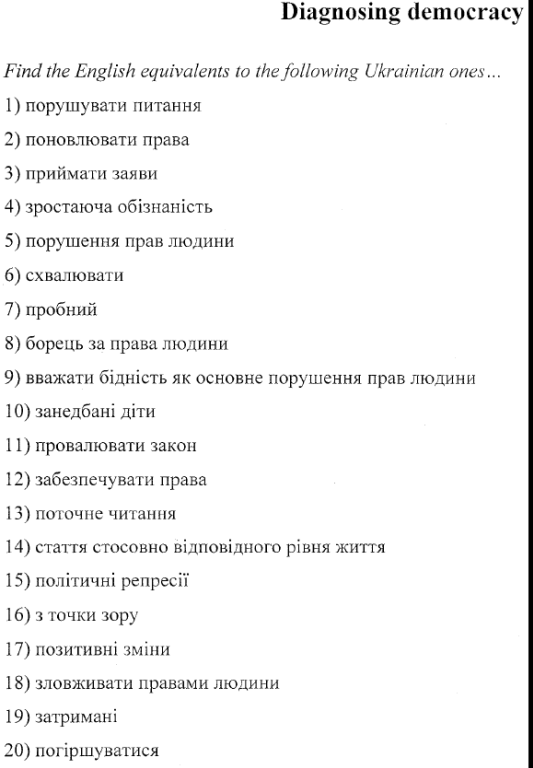
Human Dignity and Human Rights
1. “Dignity” What does this word mean to you? Use these questions as a guide:
What is dignity? How would you describe it?
When do you see the term dignity used and in what context? Can you give an example?
When do you feel like you have dignity?
What is the difference between being “dignified” and being treated with dignity?
What is the relationship between dignity and ideas like self-respect and self-worth?
How is our work and what we do to make a living connected to our sense of dignity?
What does the phrase “Human Dignity” mean to you?
Who deserves to be treated with dignity? Are some people more deserving than others? Why or why not?
Can you give an example of a time when you or someone you know was not treated with dignity? What impact did it have?
2. Using the feedback from the class discussion, develop a working definition for the phrase “Human Dignity”.
3. Work in small groups. Draw the outline of a person or a large circle.
a) Think about qualities that define you as a unique individual using their definition for Human Dignity as a guide. (Examples: curiosity, intelligence, empathy, self-respect)
b) Fill in the inside of the figure with words and phrases that describe those qualities using the following questions as prompts:
What makes me an individual and unique?
What are the qualities I am most proud of?
What do I aspire to become?
c) Next, think about what resources, supports, and protections you need to preserve your human dignity and reach your full human potential. Write all of these words outside the lines on the left side of the figure. (Examples: education, job, friends, healthcare, a supportive family, a home, etc.)
d) To the right of the figure, write all down the challenges and threats to your security and dignity. What forces or circumstances could threaten your safety, health, and human dignity, and prevent you from attaining your goals? (Examples: violence, abuse/bullying, poverty, no access to education, unemployment, lack of legal protection, illness, no access to medical care, etc.)
e) Make three columns on the board: Human Being, Protections, and Threats. Share your feedback from the brainstorming activity and record the results for each category in the corresponding columns on the board. Review the results and discuss:
Are the all Protections listed essential for humans to thrive? Of the Protections we have listed, which ones would you consider the most important?
How do these Protections ensure human dignity?
What prevents humans from having or being treated with dignity?
Once something is established as essential to the human condition, is it a right?
Are all groups entitled to the same rights? Can/should rights be universal?
Are the Threats and Protections that we have discussed the same for the women and men in your community? What are the differences/similarities?
What other factors impact our access to human rights and cause human dignity to be denied? (Example: class, race, geography, religion, sexual orientation)

TEXT 1




Text 2
Mario Puzo “The Godfather”



| 
|

The text is from The Joy Luck Club, a novel by Amy Tan. It is a story of the relationships between four Chinese mothers and their Chinese-American daughters. The daughter in this extract is called Rose.
Amy Tan (born February 19, 1952) is an American writer whose works explore mother-daughter relationships and theChinese-American experience. Her best-known work is The Joy Luck Club, which has been translated into 35 languages.
The novel consists of sixteen related stories about the experiences of four Chinese-American mother-daughter pairs. It focuses on four Chinese American immigrant families in San Francisco who start a club known as The Joy Luck Club, playing the Chinese game of mahjong for money while feasting on a variety of foods. The book is structured somewhat like a mahjong game, with four parts divided into four sections to create sixteen chapters. The three mothers and four daughters (one mother, Suyuan Woo, dies before the novel opens) share stories about their lives in the form of vignettes. Each part is preceded by a parable relating to the game.

| 
|
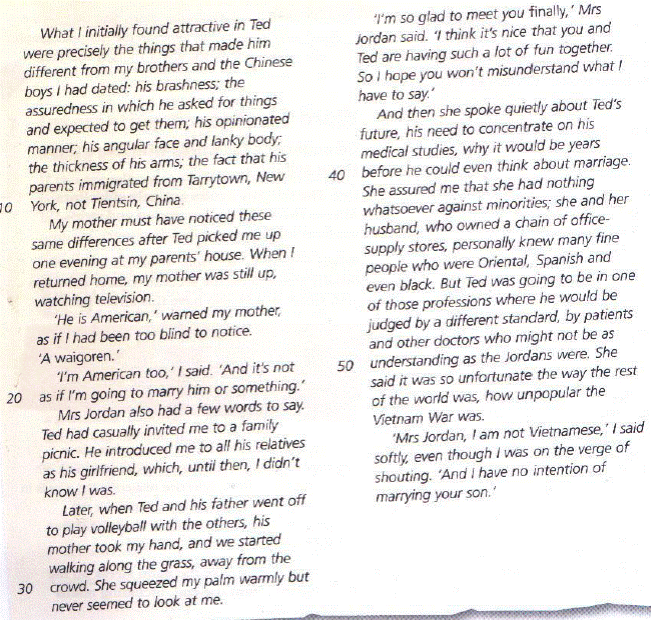

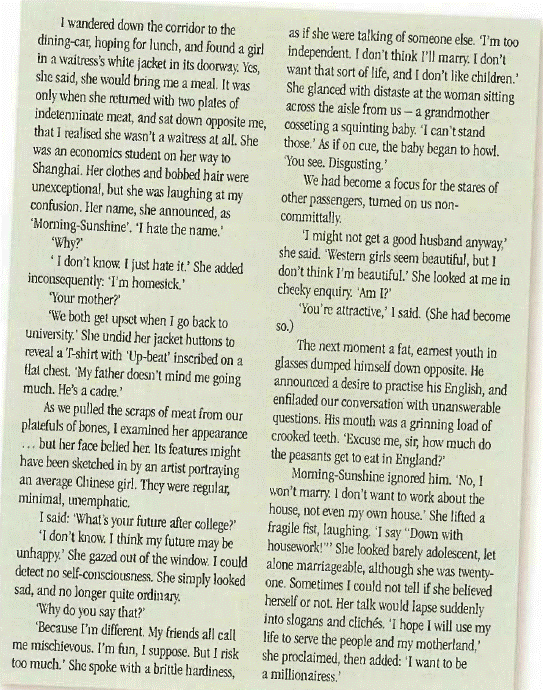
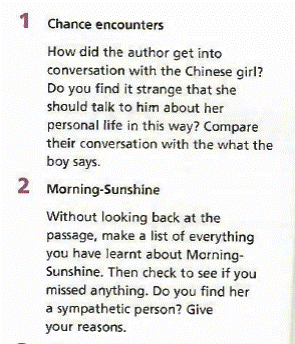




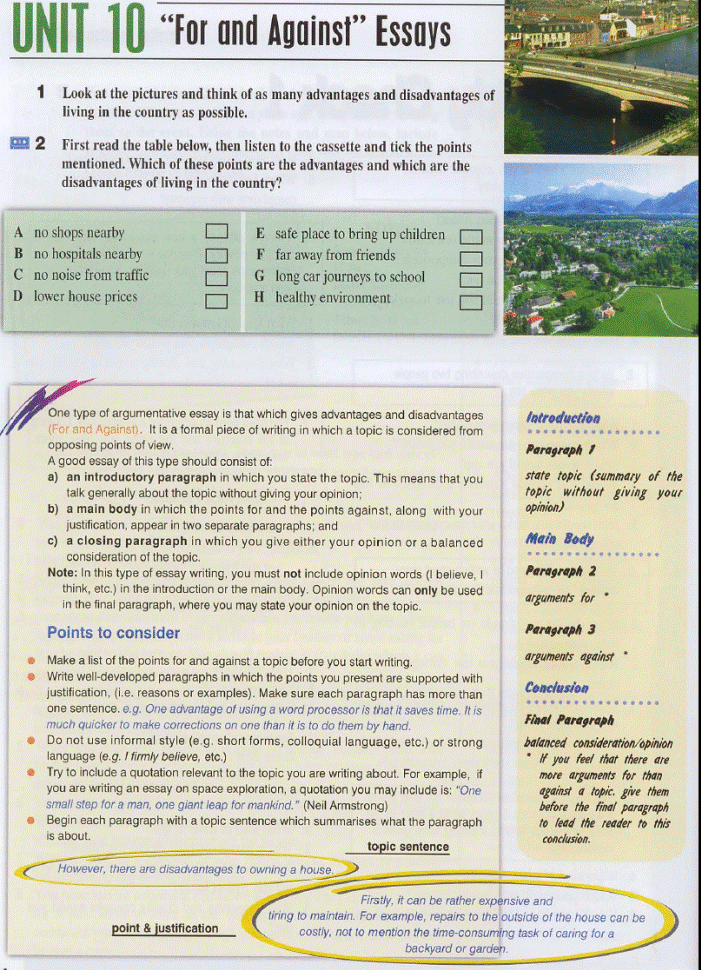
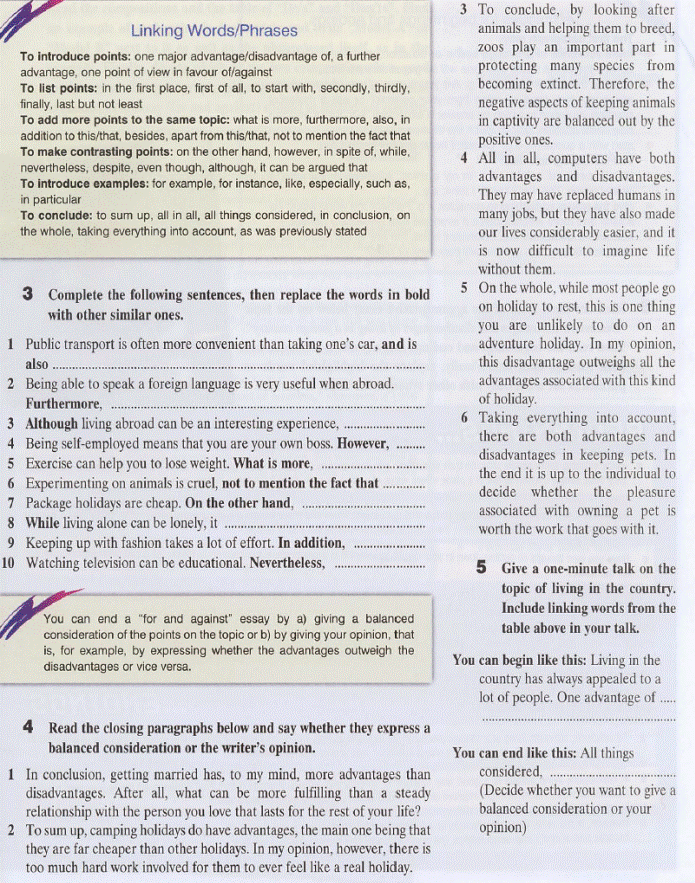


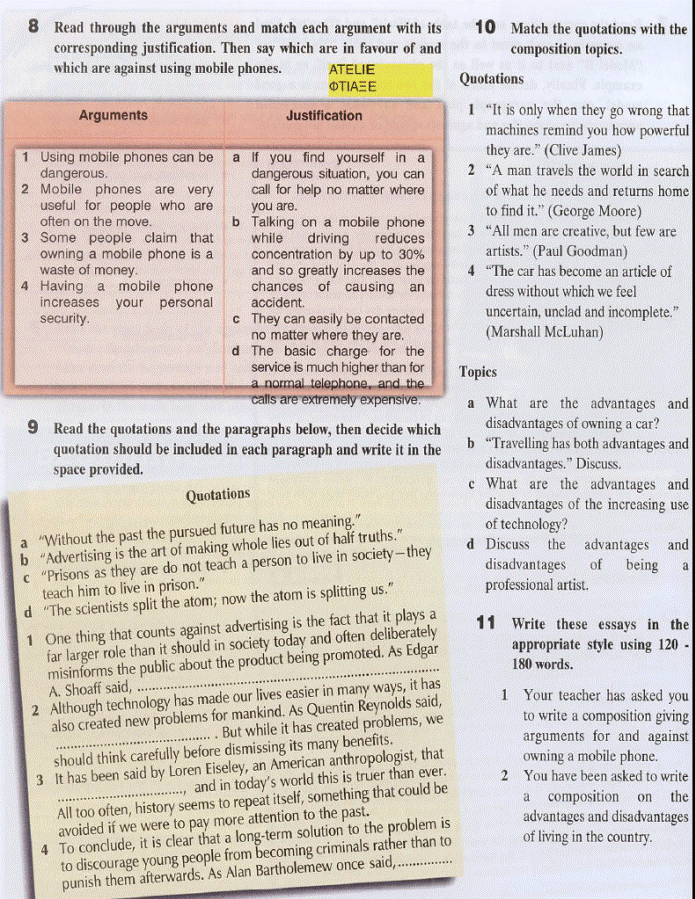


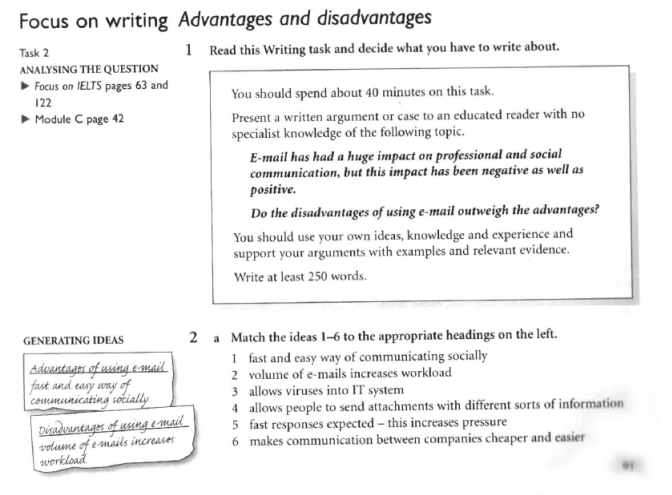



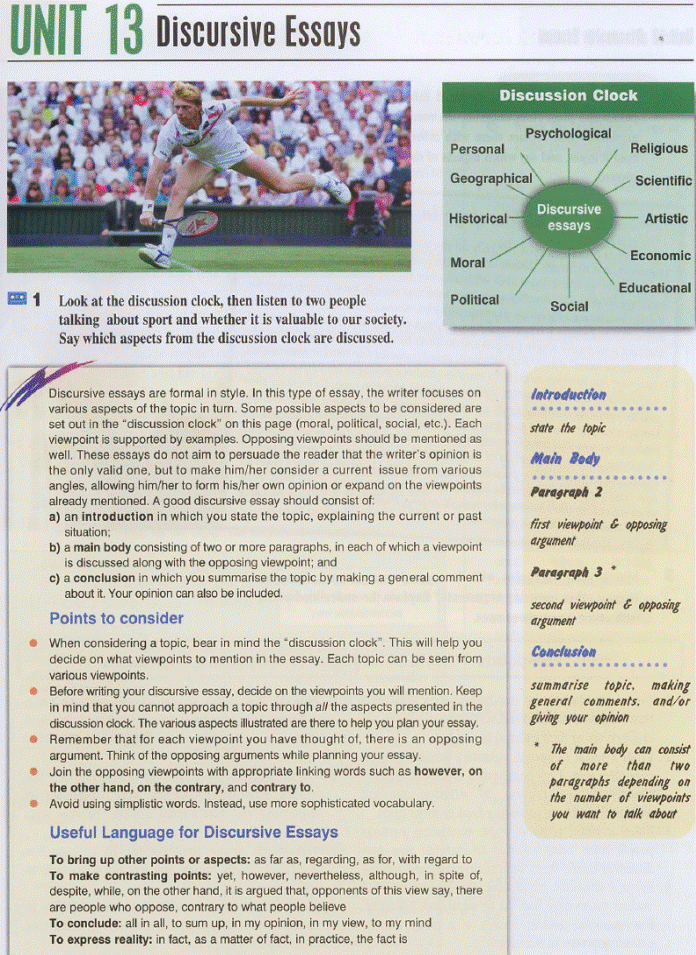


Date: 2015-12-24; view: 2226
| <== previous page | | | next page ==> |
| Exercise 11. Point out the complex parts of sentences and state what they are expressed by. | | | Tendency to use contracted forms of mood auxiliaries |